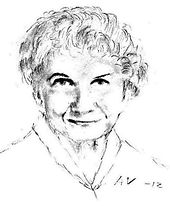Corrie (short story)

Corrie is a story by Alice Munro from 2010 and 2012, respectively, in which various possibilities of interpreting a situation are left standing side by side. For Corrie (in the 2010 version) Munro received the O. Henry Award for the third time in 2012.
action
The story is about a secret love affair between a rich young man named Corrie and a husband, and the means by which they try to keep their encounters going without his wife finding out. At dinner, Corrie's former domestic servant sees her husband accompanied by his wife. Through her indirect knowledge, she seems to shake the possibility of continuing the erotic arrangement. When the husband tells Corrie about a letter from the domestic servant asking for regular payment, a previously paid grant from Corrie for the domestic servant, which was intended for a typewriting course to give her a new professional environment, is turned into a hush money that It is paid out every six months, when Corrie hands over the sum to the husband and he takes the next steps. Years later, at the domestic servant's funeral, Corrie found out what a good person she was through and through, and she began to doubt whether the servant's demand ever existed. She decides to discard a long letter to the husband and instead write a short note as a test balloon. The husband's answer does not explain anything. Towards the end, the narrator says that it will just stay the way it is now. And then: “Too late to do another thing. When there could have been worse, much much worse. "(End of second version, 2012)
Editions and versions
The first version of Corrie appeared in 2010 in The New Yorker , the second in 2012 in Munro's fourteenth and most recent collection Dear Life , which was published in 2013 in German with the title Liebes Leben . In English, the work comprises around 20 pages.
The maid is called Sadie in the first version and Lillian in the second. From their perspective, the first version tells: “Conversation made plain that this dinner-table wife had been his wife then as she was now”, and the second: “An unknown woman with him, who, the converstation soon made plain what his wife. It was also made plain that his wife had not come recently into the picture. Her time had overlapped with Corrie's ". Compared to the first version, the last section in the second version has been replaced by a more concise and completely different text. The last sentence of this first version reads: "When she goes down to the kitchen again she goes gingerly, making everything fit into its proper place." (End of the first version, 2010)
Individual evidence
- ↑ The O. Henry Prize Stories, Author Spotlight Alice Munro , last accessed on February 10, 2014. Munro received the other two awards for the works What Do You Want To Know For? (1994/2006, O. Henry Award 2008) and previously for Passion (2004, O. Henry Award 2006).
- ↑ "So that's the way they're going to leave it." (Third to last sentence of the 2012 version)
- ↑ Alice Munro: Corrie (2010), can be read online free of charge at The New Yorker (first version).